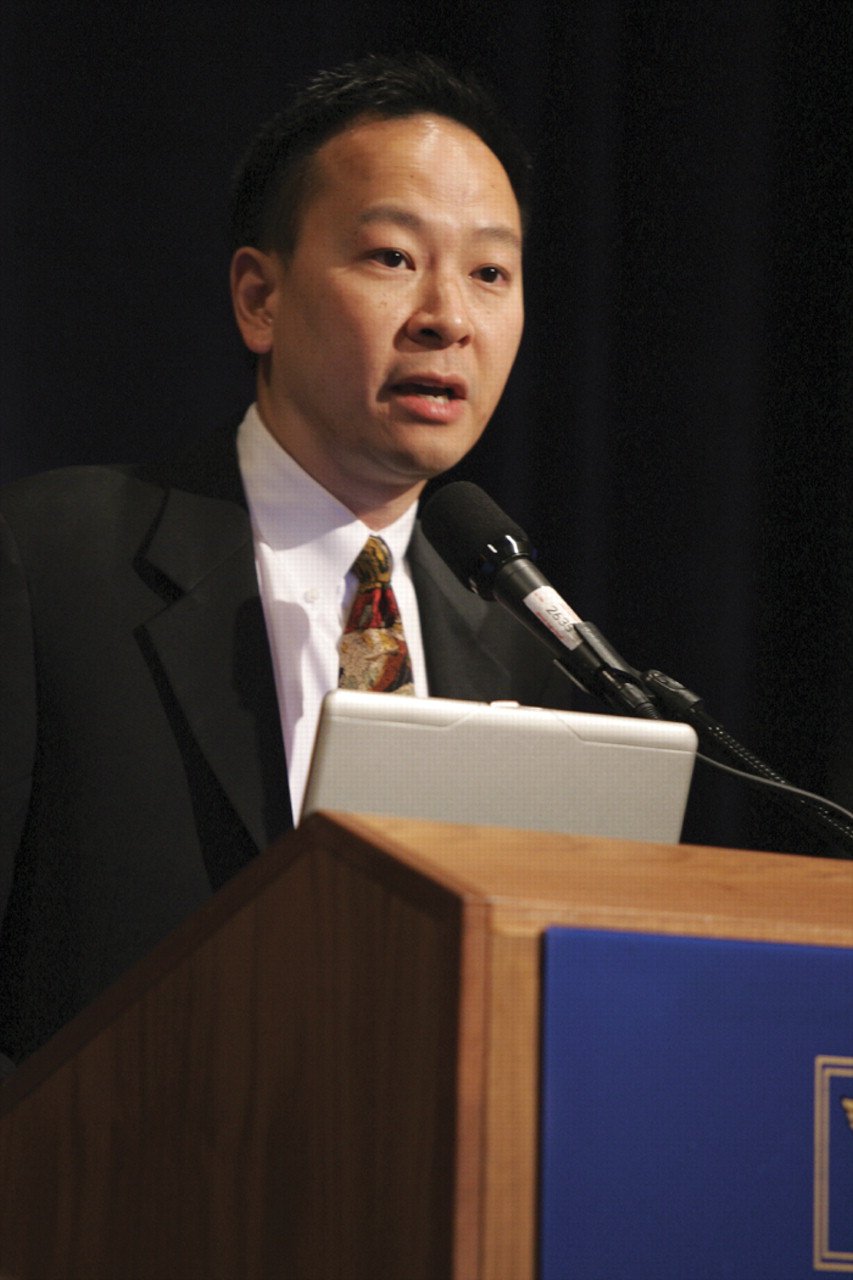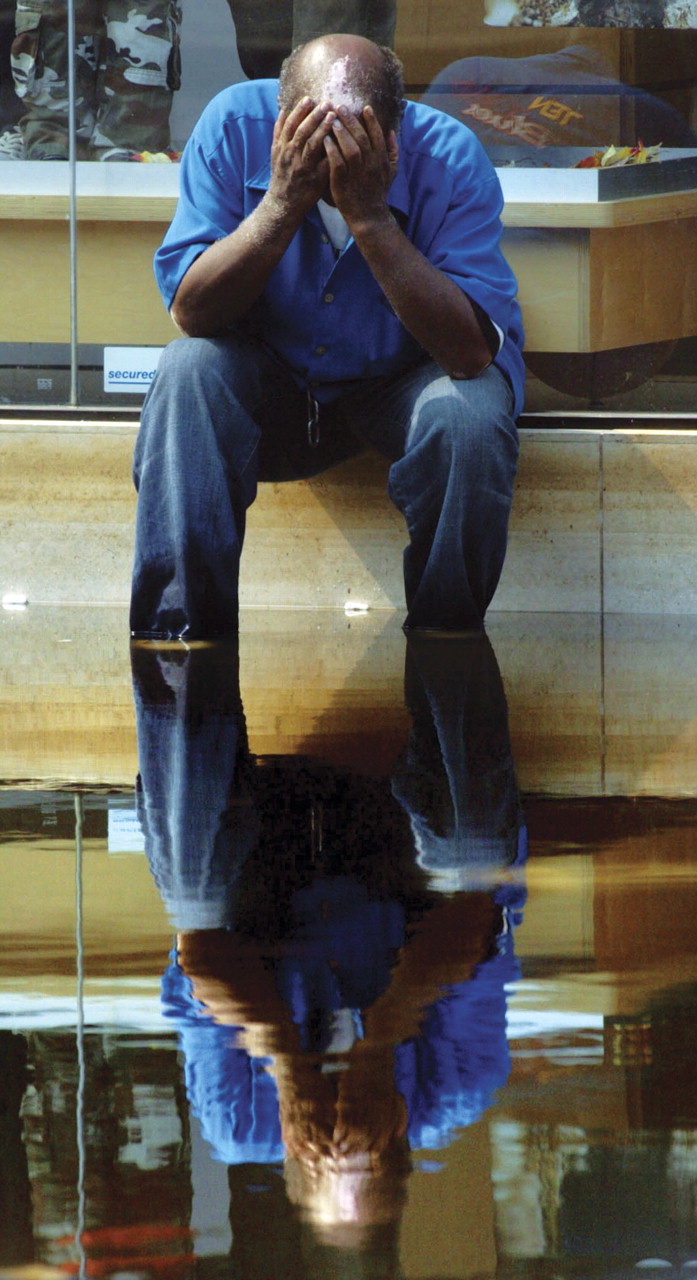APA Disaster Team, Members on Scene Mobilize Quickly
The unexpected scale of the disaster, immense infrastructure destruction at all levels, and difficulties coordinating the medical response turned Hurricane Katrina into a challenge “even worse than 9/11,” said Anthony Ng, M.D., chair of APA's Committee on Psychiatric Dimensions of Disaster (CPDD).
“We were unable to contact the district branches in the affected areas to find out if members were all right and make sure that everyone working in disaster-affected areas would be safe,” he said at the plenary session at APA's fall component meetings in Washington, D.C., about 10 days after the hurricane hit. “Many people in the psychiatric community wanted to volunteer, but the mechanism for coordinating those volunteer efforts wasn't in place to help get them to do the work.”
The CPDD was set up following the September 11, 2001, terrorist attacks and was active after the Asian tsunami last December and the recent London train bombings, said Ng. Its Internet list serve circulated information between district branches (DBs) and the disaster committee, and its Web site offered updated information. CPDD also maintains contact with federal agencies like the Department of Health and Human Services (HHS), Substance Abuse and Mental Health Services Administration, and Federal Emergency Management Agency; state emergency management agencies and departments of health; international organizations; and others.

Anthony Ng, M.D., summarizes APA response to address mental health needs of Hurricane Katrina victims, including APA members.
David Hathcox
At APA headquarters, CPDD staff liaison Erin Dalder-Alpher averaged more than 100 e-mails and dozens of phone calls each day while serving as the contact between several APA departments and members and DBs.

A man sits with his feet in the floodwaters along Canal Street in New Orleans and sobs a few days after Katrina devastated the city.
AP Photo/The News & Observer, Chuck Liddy
Even before Katrina struck the Gulf Coast on Monday, August 29, CPDD began contacting DBs and federal agencies to see what APA could do to help, said Ng.
“Then, once the hurricane hit, we began providing situation updates on the list serve to respective DBs,” he said. “We wanted to make sure that DB members were all right, that everyone working in disaster-affected areas would be safe, and that the DBs themselves were OK. We also started rapid liaisons with our state and federal partners to investigate the response needed. We have also dealt with licensing and credentialing issues in case members wanted to go to affected areas to help.”
APA's hurricane-response Web site, which can be accessed at<www.psych.org/disasterpsych/katrina/resourcecenter.cfm>, referred members who wished to volunteer to Web sites run by HHS, Medical Reserve Corps, and Red Cross. The site also offered information on preparing for potential disasters and included a letter to Congress urging that storm victims and first responders receive early follow-up mental health services, that persons with preexisting serious mental illnesses continue to receive their treatment, and that public mental health systems around the country now absorbing evacuees get the help they need (see Original article: page 7).
District Branches Respond
DBs in Louisiana, Mississippi, and Alabama were disrupted or worse by the flood or wind damage to the homes and offices of medical professionals and hospitals, by the loss of power and Internet and phone service, and by the dispersal of both doctors and patients evacuated from the region.
More than two weeks after the hurricane, the Louisiana DB—the Louisiana Psychiatric Medical Association—had spotty or nonexistent communications service. Some psychiatrists and mental health professionals coming to the state alone or in groups did not inform the DB or mental health officials of their presence, volunteer location, or intended length of stay.
The failure to coordinate meant some facilities lacked adequate mental health coverage, according to Harold Ginzburg, M.D., J.D., M.P.H., the Louisiana DB's disaster response director. On one occasion, the Baton Rouge convention center, with 5,000 temporary residents, had inadequate mental health coverage while other facilities had more than enough.
After Ginzburg left New Orleans for an evacuation camp in Mississippi, he functioned as a general physician first. “I was much more valuable as a GP,” he said, and advised colleagues who wanted to help in future disasters to remember their basic medical skills.
“That's what makes us different from other mental health people,” he said. “We're medical doctors and should have the ability to triage, diagnose, and treat basic medical conditions.”
Hundreds of thousands of Louisianans fled their state for the Houston Astrodome and other evacuation centers in neighboring Texas. The Texas Society of Psychiatric Physicians (TSPP), the Texas DB, helped coordinate the dissemination of information to members about shelter locations and staffing needs, according to Executive Director John Bush.
TSPP also worked with the Texas Medical Association to distribute information about volunteer needs in the emergency disaster relief effort and assisted out-of-state psychiatrists who volunteered to help. Hundreds of members from the private and public sectors responded and began staffing clinics in shelters throughout the state in coordination with state agencies, medical schools, and community mental health centers.
“Our biggest challenge now is the total destruction of the entire mental health infrastructure on the Gulf Coast,” said Elizabeth Henderson, M.D., of Ridgeland, Miss., president of the Mississippi Psychiatric Association.
“We're still trying to locate members,” she said a week after the storm. “A quarter of our members live in the affected area, and we don't know if anyone's missing.”
Henderson was especially concerned about disrupted care for mentally retarded individuals and patients on methadone maintenance. There are no methadone clinics in southern Mississippi—most patients go to New Orleans for treatment—and few doctors in the area are certified for buprenorphine treatment, so transferring patients to that drug will be hard, she said.
“I'm also concerned about mental health care for physicians during this crisis,” she said. “They face a dual dilemma: tremendous disruption and loss, plus increased work.”
Katrina hit Alabama less severely than Louisiana and Mississippi, said Alabama Psychiatric Society President Christopher Randolph, M.D., of Anniston. Many members along the coast were back at work within two weeks. In Alabama, the state department of public health coordinated physician volunteers, while the United Way organized volunteers in Anniston.
At press time Randolph was working with other local doctors and the counseling community to set up a general clinic and mental health services at a former military base near Anniston. Officials were preparing the base to house 1,000 evacuees, he said.
“We've seen some evacuees with PTSD and psychosis, but we'll see an increase in cases over time,” he said. “It will probably take months before we get some resolution.”
What Comes Next
Once the acute crisis is past, the medical community will have to evaluate the response to Katrina to improve coordination between agencies, the timing of resources, and how relief plans are conceived and executed, agreed the psychiatrists.
“I've spent several years working in resource-challenged places, but to see this here was quite out of place and disturbing,” said Oregon Disaster Medical Team psychiatrist Lawrence Hipshman, M.D., who has worked in Zimbabwe, Mozambique, and Uganda, among other places. “Without pointing a finger, we can say that certain things could have been done a lot better.”
In the meantime, long-term public health and human service needs of hundreds of thousands of people must be met, said Ng. Many of those needs will appear in the weeks, months, and years ahead.
As a result of their Katrina experience, Ng and the committee will recommend that APA take a more active role in coordinating volunteer efforts in future disasters, he said. For instance, APA worked before the storm with the Red Cross to improve the integration of psychiatrists into relief efforts. The Red Cross's previous policy prohibiting volunteer physicians under its purview from prescribing medications was lifted after Katrina but was inconsistently applied, he said.
As reconstruction proceeds, APA should take part in rebuilding the mental health infrastructure and residency programs, Ng said. He added that APA plans to work on credentialing and temporary licensing of physicians volunteering after disasters, both to ease the flow of doctors into affected areas and to allow displaced physicians to work in other states.
“One of the most important things is to take an active role in supporting our colleagues,” he said. “Many of us have lost jobs and practices in affected areas.”
Despite any shortcomings, many on the scene in the four states involved felt encouraged by aspects of the immediate response.
“The generosity of people in this area is just huge,” said Joni Orazio, M.D., who practices in Lafayette, La. “There was a lot on television about what went wrong, but not so much was published about what ordinary people and doctors are doing. People are so appreciative. Loving things are happening even as you feel grief in the air.”
Information on APA's hurricane response efforts, donation and volunteer information, and resource center can be accessed on APA's homepage at<www.psych.org/disasterpsych/katrina/resourcecenter.cfm>. APA's disaster psychiatry Web site can be accessed at<www.psych.org/disasterpsych>.▪



